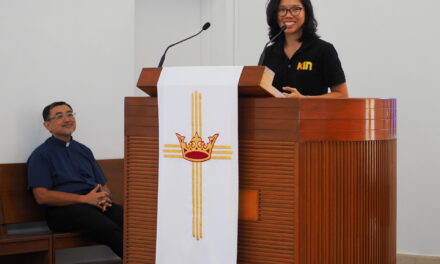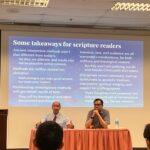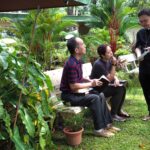
Course Descriptions - Core with Options
Course Descriptions – Core with Options
Biblical Language (OT Hebrew I/ II/ Exegesis OR NT Greek I/ II/ Exegesis)
OT Hebrew I
The basic elements of biblical Hebrew grammar will be introduced. In addition, a number of verses and passages from the Hebrew Bible will be studied and read, and some text-critical problems briefly highlighted. While the student will be encouraged to practice pronouncing and reading Hebrew, the emphasis of the course will be on learning the basic elements of written Biblical Hebrew. Hebrew songs and modern Hebrew phrases will be introduced to enhance the learning process.
OT Hebrew II
The basic elements of biblical Hebrew grammar will be introduced. In addition, a number of verses and passages from the Hebrew Bible will be studied and read, and some text-critical problems briefly highlighted. While the student will be encouraged to practice pronouncing and reading Hebrew, the emphasis of the course will be on learning the basic elements of written Biblical Hebrew. Hebrew songs and modern Hebrew phrases will be introduced to enhance the learning process. [Pre-requisite: OT Hebrew I]
OT Hebrew Exegesis
Hebrew Exegesis assumes that the student has completed both an introductory course of biblical Hebrew grammar and a basic course on Bible interpretation. This course will help the student apply the principles of textual, historical, form, redactional and pastoral criticism to selected Old Testament texts in the hope that the following course objectives might be fulfilled:
To increase students’ basic knowledge of Hebrew and Bible interpretation;
To help students see how knowledge of Hebrew assists in the task of exegesis;
To give students examples and practice in interpreting and applying Old Testament passages in a pastorally responsible way; and
To help students appreciate the need for both care and humility in interpreting the Old Testament.[Pre-requisites: OT Hebrew II, Old Testament II]
NT Greek I
This course seeks to help students gain a working knowledge of koinē Greek, sufficient for some elementary translation. The focus is on understanding the rudiments of the grammar and not on memory work. The emphasis will be on morphology. However, some basic syntactical matters will also be touched upon briefly. Its sequel is New Testament Greek II, where work on selected portions of the Greek New Testament becomes the focus. Thus, the philosophy of the entire two-part course is to get the students ready, as soon as possible, for engagement with the Greek text.
NT Greek II
This course is a sequel to Greek I. The remainder of the studies on morphology will be completed but the emphasis of the course will be on Greek syntax so as to prepare students to engage directly with the Greek text. A selected text will be set for study. [Pre-requisite: NT Greek I]
NT Greek Exegesis
This course aims to help students develop a valid methodology for NT exegesis. In order for this to be achieved, students will be taught the rudimentary principles of exegesis. Basic exegetical tools will also be introduced. The knowledge gained from all this will then be applied to selected passages from the NT. [Pre-requisites: NT Greek II, New Testament II]
Education in Christian Faith Communities or Marriage and Family
Education in Christian Faith Communities
This course explores the question, ‘what does it mean for my faith community (e.g. local church) to be an educating community for Christian spiritual formation?’ Drawing on biblical and theological principles, and supported by insights from the social sciences and educational theory, the course helps participants understand the distinctive features of the intentional educational processes in the total life of congregations, and points to ways in which these processes might be relevantly developed.
Marriage and Family
This course seeks to equip students with knowledge and skills for basic pastoral care to individuals and families in the church. It is based on a Biblical understanding of marriage and the family while drawing from key social science findings. The dynamics of interpersonal relationships and structures within the family and its life cycle will be examined. Contemporary challenges facing families will be surveyed and the church’s role in building spiritual resilience in families will be explored. [Pre-requisite: Pastoral Theology & Praxis I & II]
Denominational Studies
To acquaint oneself with the heritage and distinctive of one’s own denomination is essential preparation for ministry. Our sense of identity and sense of belonging to the Church are built upon the foundation of such understanding and appreciation. Students of respective denominations will study with their own denominational instructor the confessions, worship and liturgy, polity and constitution, and the history of their denomination.
Denominational Studies (Anglican)
This course briefly covers the three areas of Anglican Church history, liturgy and pastoralia. In the first, reference is made to the source formularies of the Church (39 Articles of Religion), as well as to more recent history. In the second area, the various liturgical offices and service forms of the Church are examined. Emphasis will be placed on the practical know-how of leading liturgical services. For the third area, students are introduced to a selection of practical church ministries in Singapore.
Anglican Historical Theology: Periods, People, and Problems (Denominational Studies II)
Anglicanism has sometimes been accused of lacking a distinctive theology. To a certain extent, the lack of a dominating central figure or definitive corpus of documents contributes to this accusation. But beyond this, such a characterisation is a misinformed caricature. It must be appreciated that Anglican thought and theology is intimately entangled with the Anglican Church and all its practical concerns. The English reformation was kindled at the heart of the English Church (and State), not in a university office or private study room. In other words, Anglican theology and ongoing ecclesial concerns are seldom dichotomised. One who seeks to understand Anglicanism must therefore study historical periods, important people then, and contemporaneous problems to fully appreciate its depth and richness. It is to this end that his module approaches the study of Anglicanism via a historical theology approach. [Pre-requisite: Denominational Studies (Anglicanism)]
Denominational Studies (Lutheran)
The course is designed for students for ministry in the Lutheran church. Students can benefit more from the course if they have already done some basic courses in biblical, theological and historical studies. The course consists of five main areas of studies: historical, confessional, liturgical-sacramental, constitutional, as well as Lutheran identity and the Lutheran World Federation.
Martin Luther’s Theology: A Contemporary Interpretation (Denominational Studies II)
What is “reformational” about the Reformation? It is Martin Luther’s theology. This course will introduce the main features of Martin Luther’s theology and what is reformational in his theology, and what remains reformational for today. It is organised around classical theological themes, using Luther’s writings as primary sources. Students will be expected to have a background in Reformation history.
Denominational Studies (Methodist)
This course introduces the history, theology and polity of the Methodist Church. Beginning with an account of the life and ministry of John and Charles Wesley, the course will trace the development and spread of Methodism from its inception as a movement in 18th century England to a world church. It will examine in detail the theology of the Methodist Church, from the innovations of John Wesley to the present. And finally, the course will examine the polity of the Methodist Church in Singapore, through an analysis of the Discipline.
Wesleyan Theology: Divine Presence, Agency & Revelation (Denominational Studies II)
This is a Denominational Studies II (Methodism) course that offers a deeper examination of the theology of the Wesleys together with engagement with primary sources. This course explores Wesleyan theology in relation to divine presence, agency, and revelation. This course engages these questions: How is God present and active at the sacraments? How is God present and active in the world? How does God reveal the Godself? How do human beings experience divine presence?[Pre-requisite: Denominational Studies (Methodism)]
Denominational Studies (Presbyterian)
The course enables students to have a fuller grasp of the Presbyterian way of life in both its historical thrust and contemporary practices. The basic components of the course are: a) the historical development of Presbyterianism; b) the theological foundation provided by Calvin and subsequent reformed theologians; c) the Confessions and Order; d) the unique features of the Presbyterian way of life — church structure and organisation, polity, holy sacraments, liturgy and worship, social responsibility, unity and diversity; and e) Presbyterianism in historical and cultural contexts, examining the Constitutions and practices of Presbyterian churches in Southeast Asia (particularly in Singapore and Malaysia).
John Calvin’s Theology and Its Interpretation Today (Denominational Studies II)
As part of Denominational Studies II, this course seeks to introduce students to the theology of the founding and preeminent theologian within our Presbyterian tradition—John Calvin (1509–1564). Students will be orientated to the main contours of Calvin’s theology through a reading of Calvin’s Institutes of the Christian Religion (1559 ed.) The course will also cover how the main contours of Calvin’s theology are received and interpreted in theological discourse today, while maintaining a keen eye for the implications of Calvin’s theology on the way we conduct ministry today. [Pre-requisite: Denominational Studies (Presbyterianism)]
Religions: Christianity and World Religions, or Islam or Buddhism or Chinese Religions or Indian Religions
Christianity and World Religions
This course introduces students to the historical development, beliefs and practices of the major religions of the world, within the context of Southeast Asia. It considers ways in which Christians might build bridges for more effective across-religion communication.
Islam
To study the genesis of Islam, its beliefs, practices, theological developments, and different movements. The various responses to the modern world by Muslims will also be studied.
Buddhism
A serious study of Buddhism in its historical context and ideological development, paying special attention to its community life, sacred writings, code of conduct and practice of spirituality. The issues of Christian witness, mission, interfaith dialogue and harmony will receive emphasis.
Chinese Religions
The course is a historical survey of the main religious traditions in China, including Confucianism, Taoism, Buddhism, and popular Chinese religions. The course will explore the origins and development of key theological, religious and philosophical doctrines as well as associated traditions and rites. The purpose is to help familiarize students to the breadth (and to some depth) of Chinese religious thought and traditions and to identify dominant themes underlying Chinese values, culture and practice. Through our study we seek to explore the nature of Chinese religions as they find expression in and influence other aspects of Chinese religions and culture in the Singapore context.
Indian Religions
To study the history, literature, beliefs, practices and religious movements of Hinduism and other related Indian Religions, from the Pre-Vedic age to the modern times.








